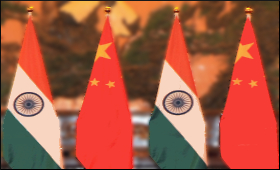|

|
India, China ink key border pact; to boost economic ties
|
|

|
|
| Top Stories |
 |
|
|
|
Ranjana Narayan | 23 Oct, 2013
Six months after their tense, three-week border stand-off, India and
China Wednesday inked a key accord to secure peace along their disputed
border, besides a slew of other agreements for boosting economic
cooperation as their leaders concurred they have "more common interests
than differences".
Besides the Border Defence Cooperation Agreement (BDCA), India and China
concluded eight other agreements as Prime Minister Manmohan Singh and
Chinese Premier Li Keqiang met for talks in the cavernous Great Hall of
the People.
The BDCA comes after Chinese troops intruded inside Indian territory in
Ladakh area of Jammu and Kashmir April 16, leading to a three-week
face-to-face situation that was resolved after hectic negotiations.
Repeated incidents on the Line of Actual Control are ascribed to
"differing perceptions" of their often unmarked 4,000-km boundary.
Premier Li, who in May visited India, said he was "sure" the border deal
will help to restore peace and tranquility in the border areas.
Manmohan Singh said both sides are in agreement that peace and
tranquility on the border "must remain the foundation for growth in
India-China ties" and both should continue negotiations for a fair,
reasonable and mutually acceptable settlement.
"This will be our strategic benchmark."
Both sides also signed an agreement on trans-border rivers, with China
agreeing to share hydrological information on the Brahmaputra for 15
more days and also to discuss "other issues" - in a tacit agreement of
India’s lower riparian rights. India has consistently voiced its
concerns about China's dam building activity upstream on the
Brahmaputra.
China also became a signatory to the establishment of the Nalanda
University, coming up in Bihar, under the aegis of the East Asia Summit.
Both sides inked an agreement on cooperation on road transport, and on
setting up of sister cities - between Delhi-Beijing, Bangalore-Chengdu
and Kolkata-Kunming.
According to the border agreement, troops of India and China will not
tail each other’s patrols and during face-to-face situations both sides
will exercise maximum self-restraint. It also envisages a hot line
between the headquarters of the two armies, the right to ask for
clarifications about the other side's troops activity and getting the
troops into "more friendly" interactions with each other.
It reiterates that "neither side shall use its military capability
against the other side and their respective military strengths shall not
be used to attack the other side".
Premier Li said that he and Manmohan Singh were in agreement that both
have "more common interests than differences" and both have confidence
that the leadership of both sides "have the ability to manage
differences along the border".
Manmohan Singh said that both agreed "that the prosperity and progress
of 2.5 billion Indian and Chinese people would be a major factor of
Asian resurgence and global prosperity and stability".
Both sides have resolved to "realize the full promise of our partnership
and maintain the friendliest of relations. This will be our strategic
vision".
Reflecting on their ties with other countries, both agreed that their
independent foreign policies with other countries "must not become a
source of concern for each other. This will be our strategic
reassurance".
Premier Li said both agreed on strategic defence cooperation and to hold
joint counter terrorism exercises in southwest China as well as joint
maritime exercises at an early date, and in countering terrorism.
On trade and economic issues, Li said both sides agreed to make full use
of their existing mechanisms and China was ready to expand its foray in
infrastructure development, including in railways, in India. He also
pushed for the Bangladesh-China-India-Myanmar (BCIM) economic corridor
to link up between their two countries.
He said China is keen to establish industrial zones in India to expand
Chinese investments in India and make two-way trade "more dynamic".
Both sides also inked an agreement on cultural exchanges.
Li said the agreement on sister cities would give a "strong boost to
cooperation" and "inject more dynamism to China India relations".
|
|
|
| |
|
|
|
|
|
|
|
|
|
|
|
|
|
|
| |
| Customs Exchange Rates |
| Currency |
Import |
Export |
US Dollar
|
₹91.25
|
₹89.55 |
UK Pound
|
₹122.85
|
₹118.85 |
Euro
|
₹107.95
|
₹104.3 |
| Japanese
Yen |
₹59 |
₹57.1 |
| As on 29 Dec, 2025 |
|
|
| Daily Poll |
 |
 |
| What is your biggest hurdle to scaling right now? |
|
|
|
|
|
| Commented Stories |
 |
|
|
|
|
|
| |
|